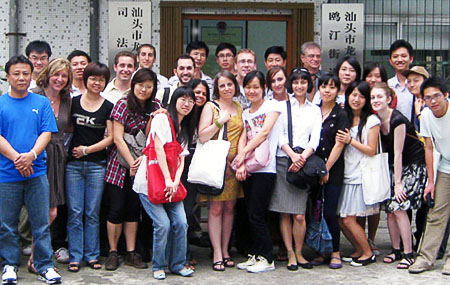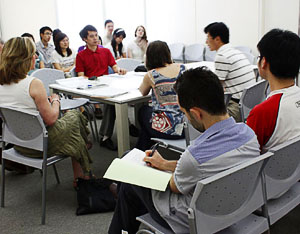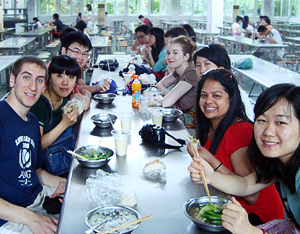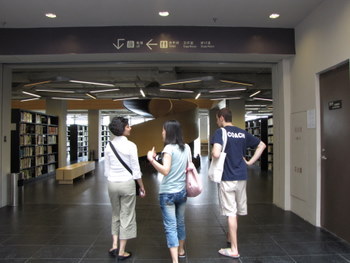Exchange paves way for friendship, comparative legal knowledge

Course readers bound flat with glue instead of held together with the usual spiral coil. Supper served from communal platters on a giant Lazy Susan. Name tags listing last name before first name, placing CHEN Shan Shan next to DE MELLO Tanya.
When 10 McGill law students embarked on a two-week exchange program to Shantou, China, this past summer, such are the cultural nuances they glimpsed, from different book binding systems to divergent social customs regarding names and food.
As the students soon discovered, these subtle but telling differences were also reflected in the two countries’ legal systems.
“In the classroom, I was surprised to discover that the Canadian and Chinese legal systems often aspire to achieve the same objectives,” says Andrew Hodhod, 3L, who found it fascinating that in heavily Confucian China, matters such as family planning and taking care of the elderly are considered paramount and actually carry respective sanctions in the Criminal Code.
“However,” he continues, “I also learned that similar aspirations do not always translate into similar realities.”
Two weeks and a lifetime of ideas

The Shantou/McGill Summer Law Program, led by Assistant Dean for Strategic Planning Véronique Bélanger, Associate Dean of Graduate Studies Rosalie Jukier and three faculty members from Shantou University Law School, included 10 days of intense course work, three joint seminars with 10 Shantou student counterparts and visits to six cities in Guangdong province along China’s southern coast.
In classes on subjects such as party leadership and judicial independence or on civil and human rights, the Canadians immersed themselves in the history and transformation of the Chinese legal system while their Chinese peers learned about the bi-juridical Canadian system and issues such as access to justice, the rule of law and the Canadian Charter.
“The most amazing part of this exchange for me was to witness how many preconceptions and myths were dispelled,” says 4L Tanya De Mello (pronounced ‘Tang-Ya’ by her Chinese friends).
“The Chinese justice system is more ‘grass roots’ than many Canadians realize,” she explains. While China has been using mediation within their justice system for decades, the importance of mediation is only now coming to the fore in Canada.
“I have overcome preconceptions and have had my viewpoint challenged,” says Corey Omer, 3L, echoing De Mello. Having the opportunity to see the judicial system in action was especially helpful for his understanding of the rule of law in China, Omer says, pointing out that the students sat in on a property law trial, spoke to judges and civil servants, and visited CIETAC, China’s arbitration center.
The visiting Canadians also often engaged in intense debates with their Chinese peers, with discussions tackling topics such as reasonable accommodation, China’s one-child policy, the death penalty and same sex marriage. The spirit of these debates was always respectful, De Mello and Omer explain; as such, the exchange also paved the way for lasting friendships.
The gift of knowledge, friendship

In the hundreds of photos the students took over the course of the trip, Marquise Lee Houle, 3L, and her Shantou roommate Jessica Zhang are invariably side by side. They sit next to each other on the bus, urge each other on in karaoke duels and flash the ‘victory’ sign at the camera in a pose ubiquitous to many Asian countries. In fact, because the pair did everything as one entity, they were given their own moniker: “Jessiquise.”
“Not only did we participate in numerous events together, share rooms on the field trips and chat about our countries, but we also planned many of our own get-togethers exploring the city and its unique life,” recalls Houle.
The idea for the exchange program grew out of a visit from members of the Li Ka Shing Foundation to McGill in 2008. Hong Kong philanthropist Li Ka Shing contributed to the founding of Shantou University in 1981 with the aim of cultivating cultural and economic development in his childhood hometown.
The Foundation also provided funding for the Shantou-McGill program, which prepares participants for legal practice in a globalizing economy and will run over the course of two consecutive summers. In 2011, 10 Shantou students will visit Montreal for two weeks and be paired with 10 McGill students.

“This program enables its participants to learn from each other and through comparison of different experiences and different legal systems,” explained Véronique Bélanger. “Our Faculty’s focus on drawing insight from difference made this program a highly valuable experience for our students and for the Chinese students as well.”
“One of the first things that I learned is how much I have yet to know about China,” says Chinese-Canadian McGill student Fangzhou Bian, 3L, adding that he finished the trip with a deeper understanding of the legal systems of his native country.
“You need to visit China to truly understand it,” concludes Tanya De Mello. “Our Chinese counterparts are quick, bright and insatiably curious. I do not doubt that they will play key roles in the development of law in China.”
